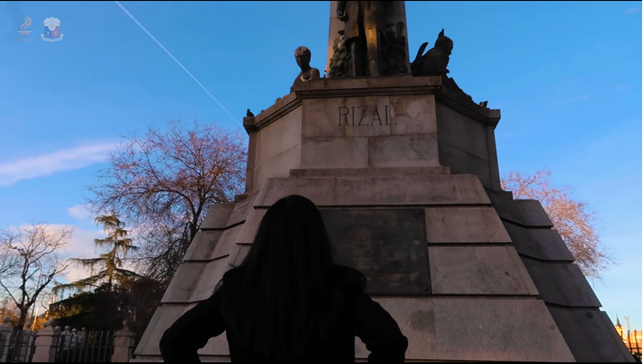6 January 2021 – The Philippine Embassy in Spain, under Ambassador Philippe J. Lhuillier, premiered the “Virtual Walking Tour of Rizal’s Madrid”, a joint production of the Embassy, through Sentro Rizal Madrid, and the National Commission for Culture and the Arts (NCCA).
The virtual tour, launched on both Facebook and YouTube, is a mini-documentary that tells the story of the years Jose Rizal spent in the Spanish capital of Madrid, between 1882 to 1885 and from 1890 to 1891.
In his opening remarks at the premiere, Ambassador Lhuillier stated his expectations that the virtual walking tour would serve as an informative and entertaining experience for all audiences to enjoy, regardless of nationality or location.
Ambassador Lhuillier added, “In creating this walking tour, it is our intention to bring the past to life, to let you walk in Rizal’s footsteps through Madrid and see the places that touched his heart and shaped his mind. As much as possible, we want our viewers to see what Rizal saw, and feel what he felt during those eventful years.”
The 33-minute video, which takes viewers through 15 places of significance to the Philippine national hero’s life in the city, was written and hosted by Dr. Ros Costelo, a UP history professor based in Madrid who recently obtained her doctoral degree with the highest marks from Spain’s most prestigious educational institution, the Universidad Complutense de Madrid.
The tour takes viewers through the streets and places that Rizal frequented in Madrid, from the various apartments he lived in, the schools that he attended, the restaurants and homes where he met with fellow activists, and much more. Dr. Costelo tells the story of Rizal’s life in Spain and how his ideas were molded by his experiences in the Spanish capital, where he went from being a foreign student to becoming a leader in the Propaganda movement, and onward to his subsequent radicalization.
The documentary also served to round out a more complete portrayal of Rizal as a person, including the challenges and frustrations he faced as a foreigner in Spain as well as his candid observations on these; the occasionally complicated relationships Rizal had with progressive Spaniards and Filipinos; and his personal concerns over his family.

The Philippine Embassy tapped the talents and expertise of overseas Filipinos in Spain. Aside from Dr. Costelo, who served as host, historical consultant, and writer, the team included Mses. Jacee Amon, Eunice Luciano and Jolina Manalang, who collectively handled the directing, filming and editing of the video. The walking tour also benefited from music freely and generously provided by Filipino guitarists Angelito Agcaoili, Adrik Cristobal, and Roland Lorilla.
After the livestreamed premiere of the virtual walking tour, the Embassy held a live Q&A session with the production team, during of which they answered queries on the film’s production, the historical details covered by the documentary, and their shared experiences in making the film.
The full version of the “Virtual Walking Tour of Rizal’s Madrid” is now available to watch on YouTube, with available subtitles in Spanish, English, and Filipino for the convenience of the viewing public.
The Philippine Embassy hopes to continue the success of this project by creating video documentaries on other aspects of Philippines-Spain relations, and by proposing the virtual walking tour concept to other Philippine Embassies and Consulates in Europe, particularly in those countries visited by Rizal in the past.

